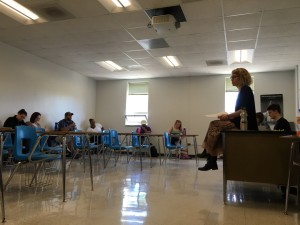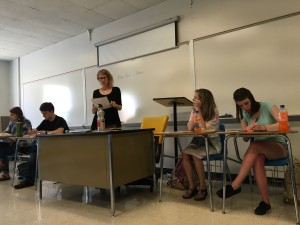
Laura Wright facilitates discussion during one of her classes. Photo by Tabitha Hill
Women’s inequality in the workplace, specifically in education, is a widely discussed topic these days.
Western Carolina University was requested by the WCU branch of the Tar Heel Chapter of the American Association of University Women (AAUW) to do a campus gender equity study in 2011. The study was completed in 2014 and presented in an open forum.
WCJ talked with expert, associate professor, and Head of English Department, Dr. Laura Wright about women’s inequality in the workplace. On a daily basis, Wright is an involved faculty member. A typical day for her consists of meetings, dealing with faculty personnel issues and student concerns, and doing things like creating the schedule, fighting for raises, fighting for additional faculty lines and promoting English faculty and students to the best of her ability.
“Dr. Wright is everything. Leaders, scholars, and teachers are supposed to be smart, strong, impactful, receptive, supportive, empathetic, encouraging, and more than that, a great colleague and friend. She simply has been terrific,” said Brent Kinser, associate professor and director of the literature program at WCU.
Wright received her undergraduate degree from Appalachian State University, her MA from East Carolina University, and her PhD from the University of Massachusetts at Amherst. She previously taught at a small liberal arts college in New York, and she currently lives in Candler, NC.
When the job at WCU opened up in 2005, Wright applied, got the job and started her career as a Catamount. She became the English department head in 2013 because she was curious about the job and wanted to try something new. Even during the busiest of times, she said she enjoys her job.
Taking on the leadership position as a woman and a boss has a whole other set of “weirdness associated with it”, she says. The obstacles that she has faced have not deterred her, though.
“I got told that I was too young, even though my boss – the dean at the time – who was a male was younger than I was. I got told not to say ‘I’m sorry’ as Department Head. There’s a lot of policing of your behavior if you’re a woman who aspires to a leadership role – and there’s a lot of expectation that you’ll be happy to take less than a man would in the same role,” said Wright in an email.
“It’s been both educational and infuriating. Yet nothing about it is surprising,” said Wright.
When discussing her position as department head she praises the unconditional support from her colleagues in the department.
“I should say that I have had huge and almost unilateral support from my colleagues in English during my time as department head, and I have never felt disadvantaged as a woman in the English Department. Once you move beyond the department, however, you notice the challenges: of the 13 Department Heads in the College of Arts and Sciences, only three are women. Only two of the nine deans are women. And while there are certainly women serving in some of the highest administrative positions at the institutions (we have a female Provost, for example), WCU has never had a female Chancellor,” she said.
In 2010 or so, Wright started a branch of the AAUW at WCU and that group was active for a while. After she became department head, she had less time to devote to that group. However, she says that AAUW is a great resource for university women and students.
When referring to how WCU differs from other universities, Wright said:

Wright as she conducts class. Photo by Tabitha Hill
“I can’t speak definitely about how WCU’s leadership compares to other institutions in terms of being more or less balanced with regard to women in leadership positions, but I can’t help but feel that we are significantly behind the times with regard to women’s leadership,” she said.
The results to the survey done at WCU in 2011 showed that male faculty member’s average salary was $68,667, while women only averaged out to $59,551. Overall, men earned higher salaries for doing the same tasks as women. A faculty forum from January 2015 explains gender differences in faculty salaries.
As far as advice for future women wanting to become teachers and professors in the education field goes, Wright suggests that they find a good mentor. When they go out on the job market, go prepared to negotiate, she said. However, she also gives a word of caution: if they plan to be an educator in North Carolina right now, do a lot of homework about the way that education is and is not being funded by the legislature. Most importantly, she says to become politically active: vote for representatives that have women and educators’ best interests in mind.
To other colleagues in the English department Wright shows incredible leadership skills, showing that women are capable of taking over higher positions.

Wright as she lectures during her class. Photo by : Tabitha Hill
“Laura Wright is an inspirational figure to me. She instills a sense of confidence and security in those she leads. As department head, I have never doubted Laura’s ability to act in the best interest of the department. She is a critical thinker, she is respectful, and she acts on behalf of the people she leads—there does not ever seem to be a personal agenda attached to her decisions. And yet, she is personable and approachable. I feel equally comfortable going into meetings with Laura as I do going to dinner with her. She is a friend, a dependable and intelligent colleague, and a respected leader,” said Diane Martinez, assistant professor in the English Department.
The motivation she has is driven from it being “profoundly unfair, unethical, and unacceptable that in 2016 women in higher education – at the institution where I work – are making less than their male counterparts,” Wright said.
Wright’s passions keep her striving to do her best every day. Volunteering at animal shelters or bringing awareness to these women issues are only some of the many she partakes in.


